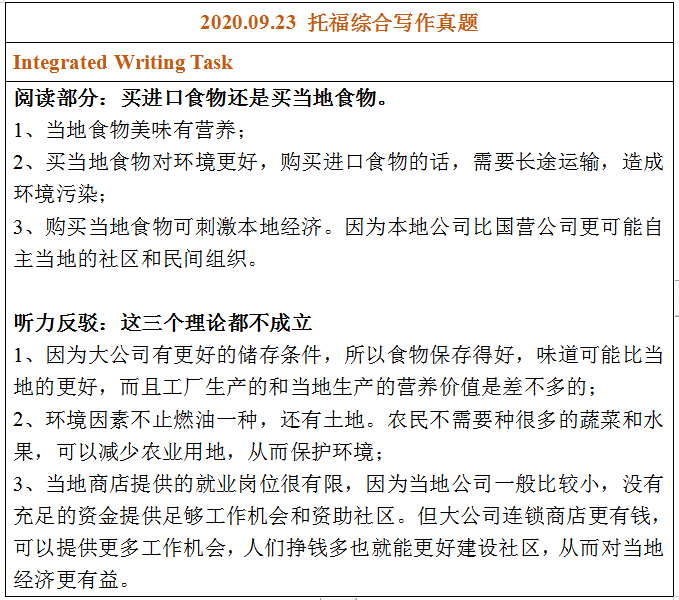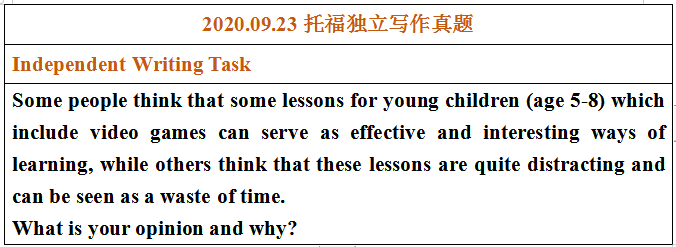
武汉新航道学校 李璕

本题重复2019年9月21日综合写作真题,考察话题难度一般,属于在托福综合写作考试中考察占比较少一些的商业类话题,主要考察商业策略的优点与缺点,从而形成对比的观点。在TPO中涉及到相关商业类话题的并不多,比如TPO 1, TPO 2, TPO 19。希望从这些综合材料能给考生关于这类话题提供可借鉴的解题思路。
Keywords: product, local, chain supermarket等。
可以类比以下TPO综合写作。
TPO 19
阅读部分:
总观点:buzzing 应该禁止。
• 消费者应该知道这些表扬产品的人是被公司付费的;
• buzzer假装私人使用者,消费者对于他们的认可会比平时少一些批判;
• 对社交有负面的影响。
听力反驳:
这三个理由都错误
• 表扬产品的人是使用过产品并真的觉得这些产品好的人;
• 人们会问很多问题,比如价格,服务和使用的时间;
• 人们会相信和乐于接受他人,因为如果产品坏,公司也不会雇佣buzzer,因此你们得到的是真诚,好的产品的宣传。
TPO1
阅读部分:
总观点:支持four-day workweek。
1 提高公司利益,因为员工休息好,灵敏度高,错误少;
2 较少失业率;
3 有益于员工提高生活质量。
听力反驳:
这三个理由都错误
总论点:反对four-day workweek
1 公司需要投入更多的钱雇佣新员工,花钱在培训,医疗和办公室上;
2 不会减少失业率,会要求员工加班,提高要求,做同样多的工作。
3 降低生活质量,不利于工作稳定性和升职。

题目解析:
9月23日的独立写作重复了2018年5月6日考题。教育类话题既是ETS考察的高频话题,也是大多数考生较为熟悉的内容。此题要留意的方面是:1. 识别“二选一”题型并注意对两个选项进行比较;2. 题目指明了年龄范围,论证时需要围绕该年龄段特点陈述理由;3. 无论是选择“电子游戏课堂”与否,都要能够突出effective,interesting或distracting,wasting time的特点。
本题选择同意“电子游戏课堂”可以写:(1)调节课堂内容避免单调(2)电子游戏也可寓教于乐(3)增加教学方式多样性。选择“无电子游戏的课堂”可以写(1)学生关注点在游戏上而不在课堂内容上(2)学生容易沉迷游戏影响学习。本文选择同意“电子游戏课堂”并以“2+1”形式展开。
From my perspective, integrating video games into courses is advisable.
First and foremost, video games ease possible boredom in class. Conventional wisdom has it that children in the 5-8 age range tend to have a short attention span and easily get tired. Then, if a tight academic schedule is imposed force-feeding the subject knowledge only, young kids will be very likely to have their interests and passion drained away in the drab mathematical formulae and rigid historical facts. In this case, teaching is expected to be spiced up from time to time to avoid wandering minds and half-asleep eyes in class. Video games to this end can serve as a necessary diversion. Refreshing visual input and sound effects otherwise stimulate students’ senses; puzzle games and strategy games provide creative outlets for their intellect and energy. A process like this will surely lift children out of the study rut and prepare them for efficient follow-up learning. Compared with a video game-free class where the monotonous learning tasks easily breed aversion to study, a technologically-facilitated teaching method featuring the involvement of electronic games truly serves the purpose of high efficiency in class.
Besides, video games also promote learning. While many people used to deem video game the root of all evil, which should especially be kept away from children, the stigma has seemed to fade with further study of it going on: those electronic games can actually both entertain and inform. By means of storytelling and role playing, video games easily make the player feel part of the context and arouse curiosity for the elements covered in it, such as a specific historical era. Consider “Legends of the Three Kingdoms”, a popular card game in China. To perform well in this game, one has to have a good command of historical events in Three Kingdoms period and acquaint himself with its historical figures, which therefore pushes him or her into enriching the relevant knowledge. Another example may be that “Legends of the Three Kingdoms”, believed to be an interesting window into the classical culture in China, was in 2012 built into the curriculum as an elective in University of California, Berkeley. It is therefore justifiable to argue that the synthesis of video games with teaching can be an ideal contributor to some subject learning.
Admittedly, I am also aware of many people’s concern about children’s poor self-discipline, which tend to make video game a drag on study. However, as long as the teacher allocates an appropriate time to the game in class and centers on the educational value of it, it is not so likely that the children will be negatively affected and waste time.
Judging from what has been discussed above, we safely draw the conclusion that incorporating video games into courses is academically rewarding.